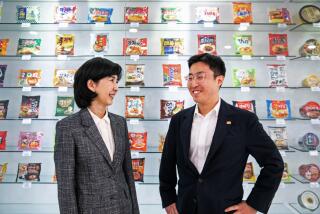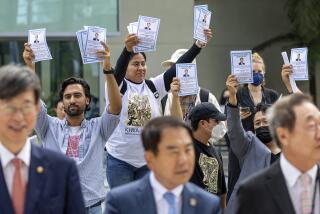Conglomerate Seizes Chance to Improve
- Share via
SEOUL — Doosan Group may be better known for beer and baseball, but it has also become a poster child for economic reform.
Over the last two years, South Korea’s 14th-largest chaebol, or conglomerate, has shrunk its operation from 29 companies to 12, sold a half-interest in its headquarters building to a local bank and formed a joint venture with a Belgian firm, Interbrew, to operate its faltering Oriental Brewery, maker of OB beer.
After South Korea’s economy collapsed last fall, most of its leading chaebol resisted making the painful changes pushed by the South Korean government and foreign lenders, such as selling or closing unprofitable ventures and cutting their debt.
But faced with the collapse of their domestic market and a shortage of capital, some mid-size South Korean conglomerates, including Doosan, have used the crisis to improve their competitive positions, according to Cho Dong Sung, president of the Institute of Industrial Policy Studies at Seoul National University.
If this trend continues, Cho predicts, some of these smaller firms could end up challenging the larger and less agile chaebol that have traditionally dominated the economy in South Korea.
“They may end up with enough cash reserves to buy much bigger chaebol,” he said.
Doosan had reasons to move quickly. When the South Korean economy went into a tailspin, the company was still suffering image problems from a major environmental disaster at its huge copper laminate factory in 1991, and its OB beer was locked in a fierce battle against an upstart competitor called Hite.
Doosan executives were already looking for ways to improve their battered balance sheets and decided they had to dump some money-losing operations and focus on their core businesses of alcohol, beverage and fast-food sales, electronics components and construction.
In addition to Oriental Brewery, the firm operates the South Korean franchises for Burger King and Polo Ralph Lauren; has a joint venture whiskey operation with Seagram Co.; and produces soju and chongju, Korean liquors.
Some of the casualties of Doosan’s cost cutting have been its refrigeration unit, a forklift production facility and a dairy operation. The firm also liquidated its shares in 3M Korea, Nestle Korea and Eastman Kodak, and sold its Coca-Cola bottling operation to Coca-Cola Co.’s Korea division.
“There were rumors in the market that Doosan was ready for bankruptcy because it was selling off everything,” said Kim Seung Soo, a Doosan spokesman. “But quite to the contrary, the financial status of Doosan is getting much healthier.”
Doosan executives admit they don’t have all the answers, particularly to the thorny question of reducing staffing in a country used to lifetime employment. So far they have trimmed the work force from 20,000 to 15,000 by not filling empty positions. And it is even harder to cut the fat when the money-losing employees happen to be popular athletes.
So for now, Doosan will keep its unprofitable baseball team, the OB Bears, even though the team is ending its season at the bottom of South Korea’s professional baseball league. “Nowadays, their scores are very bad,” Kim admitted. “But we love the OB Bears.”
* PROMISES UNFULFILLED: South Korea’s economic reforms are falling short. A1
(BEGIN TEXT OF INFOBOX / INFOGRAPHIC)
Ailing Exports
South Korea’s efforts to boost its exports have been thwarted by the collapse of Asian markets, the weakening of the yen, Russia’s economic free fall and a slowdown in its most promising export markets in the U.S. and Europe. Monthly South Korean exports since last summer, in billions of dollars:
$9.9 billion
Source: South Korea Ministry of Trade
More to Read
Inside the business of entertainment
The Wide Shot brings you news, analysis and insights on everything from streaming wars to production — and what it all means for the future.
You may occasionally receive promotional content from the Los Angeles Times.










